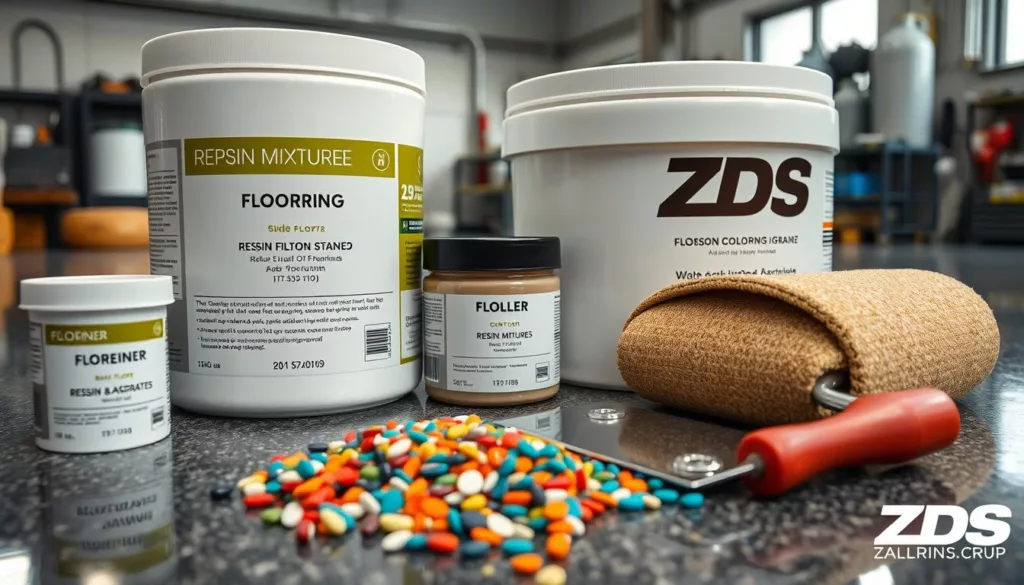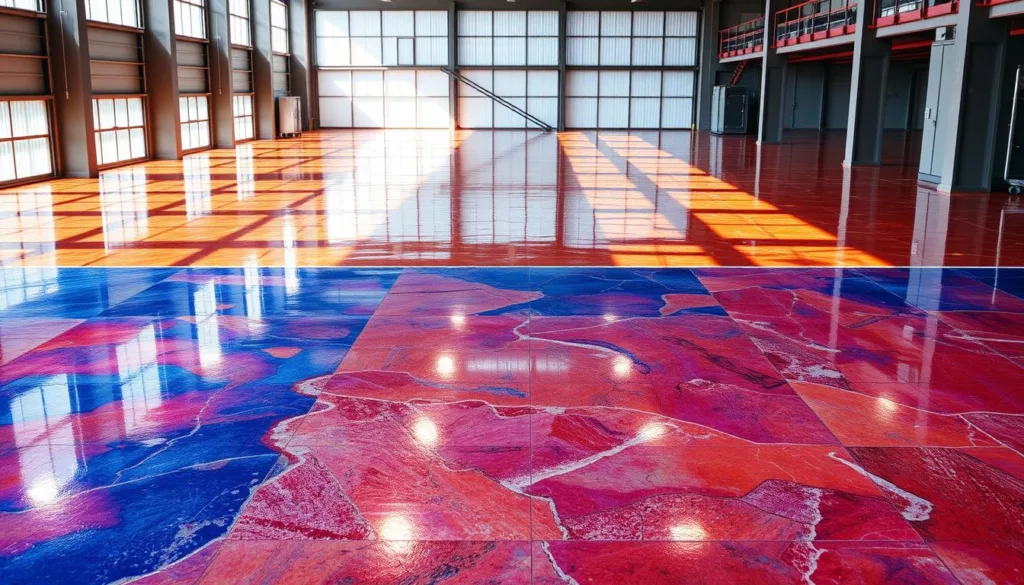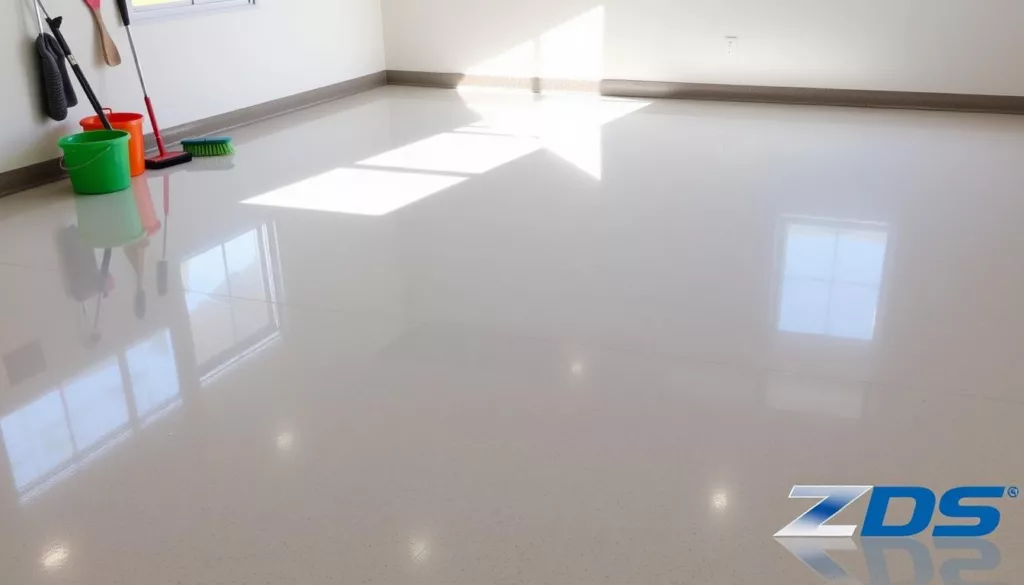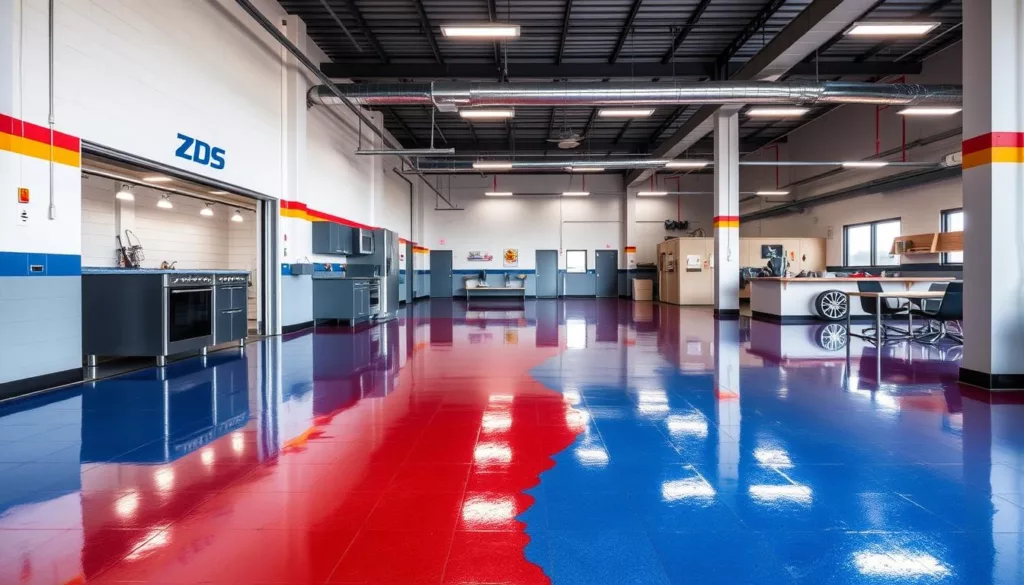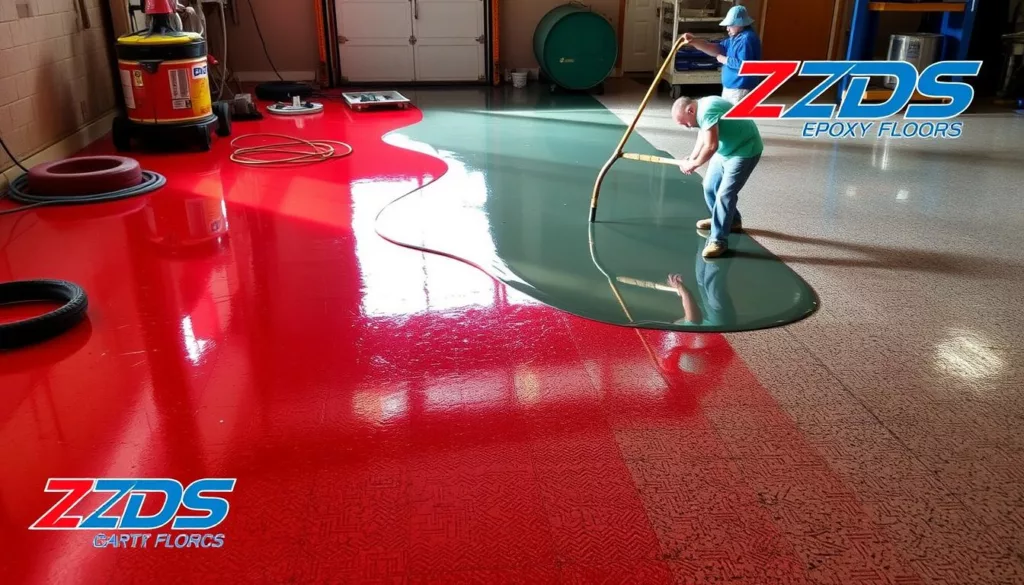Epoxy flooring is known for its durability and beauty. It’s strong, resistant to chemicals, and looks great. This makes it a favorite for many businesses and industries. But, how long does an epoxy floor really last? Let’s explore the durability of epoxy flooring and what affects its lifespan.
Key Takeaways
- Epoxy floors can last between 10 to 20 years with proper installation and maintenance.
- The durability of epoxy flooring is influenced by factors such as environmental conditions, traffic volume, and installation quality.
- Epoxy floors are commonly used in commercial and industrial settings, providing a durable and easy-to-maintain option.
- Proper surface preparation, application methods, and curing conditions are key to extending an epoxy floor’s life.
- Regular cleaning and maintenance are vital to keep epoxy floors looking good and lasting longer.
Understanding Epoxy Flooring and Its Components
Epoxy flooring is known for its durability and lasting performance. To grasp its benefits, we need to explore its chemical makeup and the different epoxy systems available.
The Chemical Composition of Epoxy
Epoxy is a thermosetting polymer made from an epoxy resin and a hardener. This mix undergoes a chemical reaction. It results in a strong, rigid material that can be customized for various needs.
Different Types of Epoxy Systems
Epoxy flooring comes in various systems, each with its own traits and uses. These include:
- Solvent-based epoxy systems
- Water-based epoxy systems
- 100% solids epoxy systems
- Epoxy-polyurethane hybrid systems
The Role of Hardeners and Resins
The hardeners and resins in epoxy are key to its final properties. Choosing the right ones affects curing time, chemical resistance, and durability. Companies like ZDSpoxy formulate their products for top performance and longevity.
“Epoxy flooring is a versatile and durable solution that can transform any space, delivering a high-gloss, slip-resistant, and chemically resistant finish.”
Knowing about epoxy’s chemical makeup and the different systems helps you pick the best epoxy resin for your flooring needs.
What is the durability of epoxy flooring
Epoxy flooring is known for its long-lasting quality. Epoxy floors are known for lasting longer than many other flooring options. They can last 10 to 20 years or more with the right care.
The secret to epoxy’s long life is its durability. Epoxy resin, the main part of epoxy flooring, is very durable. It can handle a lot of foot traffic and harsh conditions. This makes epoxy great for busy places like warehouses and commercial areas.
| Epoxy Flooring Attribute | Performance |
|---|---|
| Wear Resistance | Exceptional |
| Chemical Resistance | Highly Resistant |
| Impact Resistance | Excellent |
| Abrasion Resistance | Superior |
The quality of epoxy floors also comes from how they’re applied. The right prep, mix, and installation are key. These steps help epoxy floors last a long time.
“With proper care and maintenance, epoxy floors can easily last a decade or more, making them a cost-effective and durable choice for a wide range of commercial and industrial applications.”
Epoxy flooring stands out for its durability and long life. It’s a reliable, easy-to-care-for option. Knowing what makes epoxy durable helps you decide if it’s right for you.
Factors Affecting Epoxy Floor Longevity
The durability and lifespan of epoxy flooring depend on several factors. Knowing these elements is key to keeping your epoxy floor in top shape. Let’s look at environmental conditions, traffic patterns, and installation quality that affect epoxy floor’s epoxy durability factors.
Environmental Conditions
The environmental impact on epoxy is very important. Epoxy floors can get damaged by UV rays, extreme temperatures, and chemical spills. To protect the floor, you need to use the right sealants and maintenance practices.
Traffic Volume and Type
The amount and type of foot traffic can affect an epoxy floor’s lifespan. Areas with a lot of foot traffic, like warehouses, need a stronger epoxy. Heavy machinery or vehicles can also wear down the floor faster, requiring a more durable epoxy.
Installation Quality
The quality of the installation is critical for an epoxy floor’s longevity. Good surface preparation, the right mix, and following application guidelines are essential. If the installation is poor, the floor may crack, peel, or delaminate, affecting its epoxy floor maintenance and durability.
| Factor | Impact on Epoxy Floor Longevity |
|---|---|
| Environmental Conditions | UV rays, extreme temperatures, and chemical spills can damage the epoxy, requiring additional protection and maintenance. |
| Traffic Volume and Type | High-traffic areas and heavy machinery can accelerate the deterioration of the epoxy floor, necessitating a more durable system. |
| Installation Quality | Proper surface preparation, accurate mixing, and adherence to application guidelines are critical for the epoxy’s long-term performance. |
By understanding these epoxy durability factors, you can make better choices. This ensures your epoxy floor stays in great condition for a long time, making your investment worthwhile.
Common Applications and Expected Lifespan
Epoxy flooring is used in many places, like industrial areas, commercial spaces, and homes. How long it lasts depends on where it’s used. But, with the right care, these floors can last a long time.
In places like factories and warehouses, epoxy flooring applications are common. They can handle a lot of wear and tear. These floors can last 10 to 20 years, or even longer with good care.
For commercial epoxy flooring, like in stores and offices, the lifespan is usually 5 to 10 years. These floors get some wear and tear but are easy to keep up. They’re a favorite for many businesses.
In homes, epoxy flooring is a good choice for busy areas like garages and basements. It’s not as used as in other places, but it’s durable. It can last 5 to 10 years.
| Application | Expected Lifespan |
|---|---|
| Industrial Epoxy Floors | 10 to 20 years |
| Commercial Epoxy Flooring | 5 to 10 years |
| Residential Epoxy Flooring | 5 to 10 years |
The lifespan of epoxy floors can change based on a few things. Quality of installation, how often it’s maintained, and the environment it’s in all play a part. Knowing this helps you choose the best epoxy flooring for your needs.
Proper Installation Techniques for Maximum Durability
To make your epoxy floor last long, it’s key to install it right. This means getting the surface ready, applying the epoxy correctly, and curing it under the best conditions. Each step is important for a long-lasting epoxy floor.
Surface Preparation Requirements
Getting the surface ready is the first step for a durable epoxy floor. You need to clean it well, remove old coatings, and fix any cracks or imperfections. Sometimes, you might need to grind, blast, or etch the surface to get it right for the epoxy.
Application Methods
Applying the epoxy is just as critical as preparing the surface. You’ll need the right tools and methods to apply it evenly and without bubbles. It’s also important to mix the epoxy correctly and manage its pot life to get the best results.
Curing Conditions
The curing process is vital for your floor’s long-term strength. You need to keep the temperature, humidity, and air flow right during this time. This ensures the epoxy hardens fully and becomes strong and durable.
By following these steps, you can make your epoxy floor installation last longer. You’ll get a floor that’s durable and can handle the wear and tear of your space.
Maintenance Requirements for Epoxy Floors
Keeping your epoxy floors looking great and lasting long needs careful attention. Proper care is key to making your floors last. With a few easy steps, your epoxy floors will stay beautiful for many years.
Cleaning and Protecting Epoxy Floors
Cleaning your floors regularly is the first step. Use a gentle, pH-neutral cleaner and a soft brush or mop. This helps remove dirt and spills without harming the floor. Clean your floors every week or two for the best results.
Adding a floor polish or sealant can also help. These products create a shield against scratches and spills. Reapply the sealant every 12-18 months, as the maker suggests.
Addressing Stains and Spills
Act fast if you spill something on your floors. Use a clean cloth to soak up the spill. Then, use a mild detergent or epoxy cleaner to clean the stain. Make sure to rinse well with clean water.
If stains are tough, try a light abrasive cleaner or a soft scrubber. Always test a small area first to avoid damage.
Preventing Damage and Extending Lifespan
- Use floor mats or rugs at entryways to catch dirt.
- Don’t drag heavy items across the floor to avoid scratches.
- Fix any cracks or chips right away to stop more damage.
- Get professional help if you need to recoat or refinish your floors.
By following these epoxy floor care tips, you can keep your floors looking great and lasting long. Stay consistent with maintaining epoxy flooring to enjoy your beautiful floors for years.
Signs of Epoxy Floor Wear and Damage
Keeping your epoxy floor in top shape is key to its long life. Knowing the signs of wear and damage helps you fix problems early. This way, your floor will keep serving you well. Let’s look at the visual signs, structural problems, and when it’s time to recoat your epoxy floor.
Visual Indicators
The first signs of epoxy floor wear show up visually. Watch for:
- Discoloration or fading of the floor’s surface
- Visible cracks, chips, or pits in the epoxy coating
- Peeling or delamination of the epoxy layer
- Excessive wear patterns, mainly in busy areas
Seeing these signs means it’s time to think aboutrecoating epoxy floors. This will make your floor look good again and protect it.
Structural Issues
More serious problems with your epoxy floor include structural issues. Look for:
- Widespread cracking or buckling of the epoxy layer
- Uneven or sunken areas that show substrate failure
- Signs of epoxy floor damage, like flaking, delamination, or loss of adhesion
Structural problems can weaken your floor. They might need more than justepoxy repair or even a new floor.
When to Consider Recoating
Regular checks on your epoxy floor’s state are important. Recoat when you see:
- Significant wear and tear, with over 20% of the surface affected
- Visible cracks or damage that affects the floor’s use
- A clear drop in the floor’s slip resistance or grip
Recoating early can make your epoxy floor last longer and work better.
By watching for wear and damage signs and acting fast, you can make your epoxy floor last longer. Regular care and timely recoating or repair will keep your floor strong and reliable for many years.
Cost Comparison: Epoxy vs. Other Flooring Solutions
Choosing the right flooring depends a lot on cost. Epoxy flooring is a good choice compared to concrete, tile, and laminate. It offers a strong value.
Epoxy floors cost more at first, but they save money in the long run. They last long, resist wear and tear, and need little upkeep. This means big savings over time.
| Flooring Type | Average Installation Cost (per sq. ft.) | Estimated Lifespan | Flooring Options Comparison |
|---|---|---|---|
| Epoxy | $3 – $12 | 10 – 20 years | Durable, chemical-resistant, easy to maintain |
| Concrete | $2 – $6 | 20 – 50 years | Durable, but can be prone to cracking and staining |
| Tile | $5 – $25 | 50+ years | Highly durable, but can be costly and labor-intensive to install |
| Laminate | $2 – $7 | 10 – 20 years | Affordable, but not as durable as other options |
Epoxy floors cost more at first, but they save money later. They need less upkeep and last longer. This makes epoxy a smart choice for many places.
Professional Installation vs. DIY: Impact on Longevity
Choosing between professional installation and DIY for epoxy flooring affects how long it lasts. While DIY might seem appealing, hiring epoxy floor contractors offers many benefits. These benefits lead to a floor that lasts longer and is more durable.
Professional teams have a lot of experience and knowledge. They know how to prepare surfaces, choose the right products, and apply them correctly. This ensures a top-quality finish that lasts.
On the other hand, DIY projects can lead to mistakes. These mistakes might include wrong mixing, poor surface prep, or bad application. Such errors can make the epoxy wear out faster, change color, or even fail.
Also, pros like ZDSpoxy often give longer warranties. This means they stand behind their work, giving you peace of mind. It shows the value of hiring experts for a floor that lasts.
“Investing in professional epoxy installation may cost a bit more upfront, but it’s an investment that can pay dividends in the long run through a durable, long-lasting floor.”
While DIY might seem cheaper, the risks of not getting it right are too high. Working with experienced epoxy floor contractors ensures your floors look great and work well for years.
Conclusion
Epoxy flooring is a top choice for many reasons. It’s durable and lasts a long time, making it great for different places. Its unique makeup and many types make it both versatile and strong.
If you want floors that last in busy spots or can handle tough conditions, epoxy is perfect. Knowing how to care for it helps keep your floors looking good for years.
In short, epoxy flooring offers amazing epoxy flooring benefits. It creates long-lasting floors that are perfect for any space. When you’re ready for a new floor, think about how epoxy can protect and last for a long time.
FAQ
How long does epoxy flooring typically last?
Epoxy flooring is very durable. It can last from 10 to 20 years or more. This depends on how well it’s installed, maintained, and where it’s used.
What factors affect the longevity of epoxy flooring?
Several things can affect how long epoxy flooring lasts. These include the environment, how much and what kind of traffic it gets, and the quality of its installation. Proper preparation, application, and curing are all important for a long-lasting floor.
How does the cost of epoxy flooring compare to other options?
Epoxy flooring might cost more to install than some other options. But, its long-lasting nature and low upkeep can save money in the long run. It’s a smart choice for many businesses and industries because of its high return on investment.
Should I hire a professional for epoxy floor installation?
Yes, it’s best to hire a professional for epoxy floor installation. Experts like ZDSpoxy bring a lot of knowledge and care to the job. This can greatly improve the floor’s performance and lifespan compared to doing it yourself.
How can I maintain my epoxy floor to extend its lifespan?
Keeping your epoxy floor in good shape is important. Clean it regularly with the right products. Fix any damage or wear quickly. And, follow the right steps for recoating or repairs when needed.

